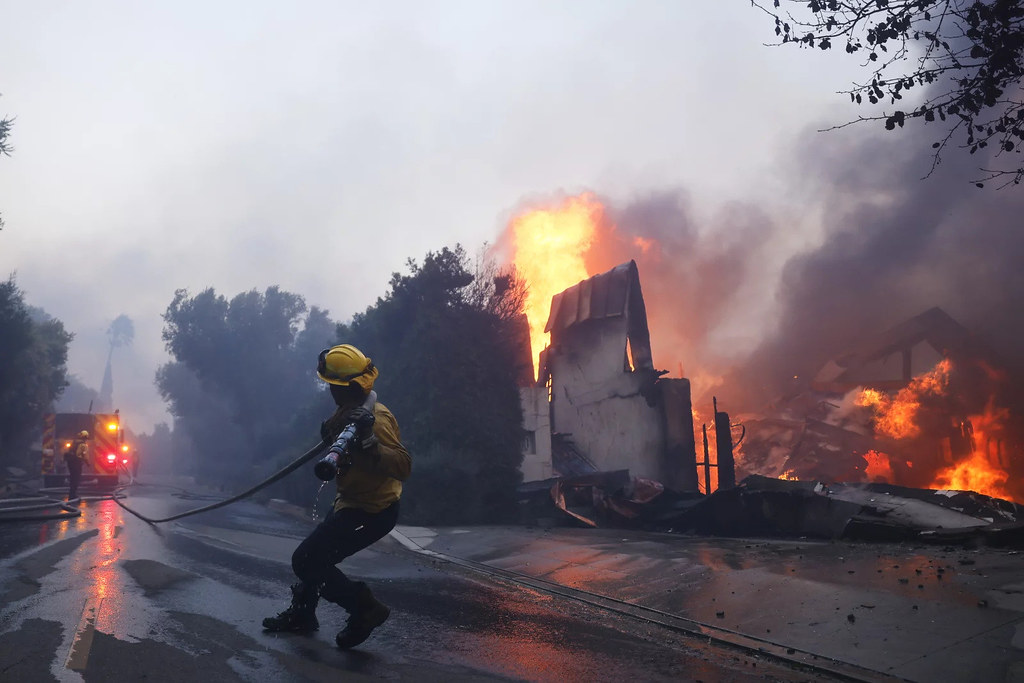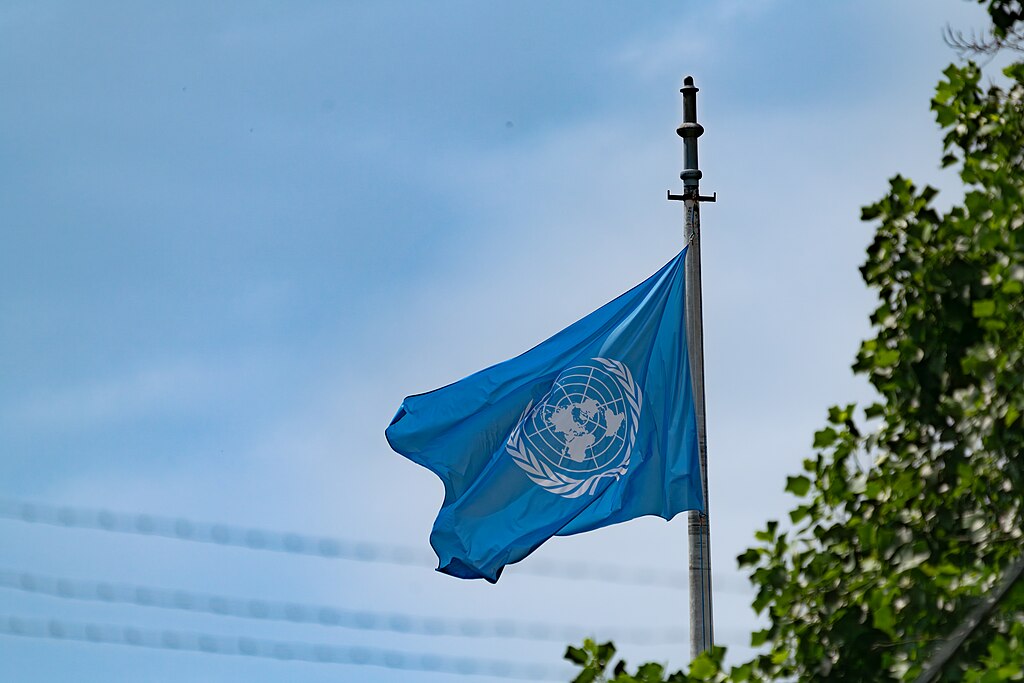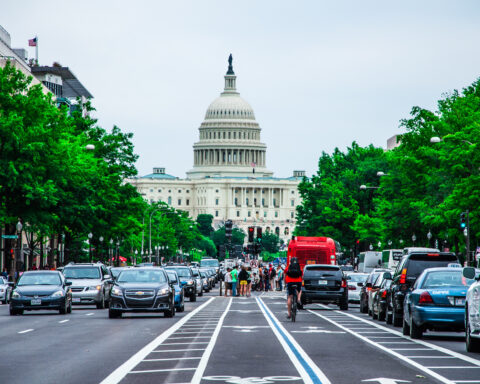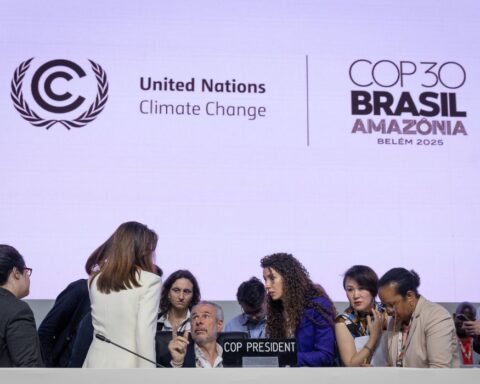For the first time, the International Court of Justice in The Hague has determined that states have legal obligations to protect the planet from greenhouse gas emissions and limit climate harms, not just under the Paris Agreement, but under international law as well.
“You could hear a pin drop – not just in the Great Hall of Justice, but across thousands of homes, classrooms, and offices around the world tuned in to watch,” Christiana Figueres, the influential climate activist and a key architect of the Paris Agreement, wrote in a post on LinkedIn about the opinion delivered by Judge Iwasawa Yuji on July 23.
“In short, phasing out fossil fuel production is no longer only a scientific demand – it’s a legal imperative,” Natalie Jones, a policy adviser for the International Institute for Sustainable Development, wrote. “A state’s fossil fuel production, fossil fuel consumption, granting of fossil fuel exploration licenses, and the provision of fossil fuel subsidies may constitute an internationally wrongful act which is attributable to that state.”
But will countries Russia, Saudi Arabia or China pay attention to the ruling? Yes, Figueres later wrote: “Even if this opinion is not binding, it clarifies and consolidates existing legal duties. It strengthens the legal foundation upon which more and more climate litigation is being built, and it gives moral and jurisprudential weight to the demands of citizens, youth, and vulnerable nations.”
“The highest UN court made it clear that climate issues are inherently linked to international law and human rights, and that past and present responsibilities for its consequences can be attributed,” Ana Toni, CEO of the COP30 climate conference in Brazil, wrote. “The opinion also leaves no doubt that, although climate change affects everyone, its most vulnerable victims have faces, colors, genders, and nationalities.”
Read more excerpts from posts written by climate lawyers, scholars and activists responding to the ICJ opinion:
Legal wings

Today, Judge Iwasawa Yuji, President of the International Court of Justice (ICJ), delivered the ICJ’s Advisory Opinion on climate change.
It is the most far-reaching legal statement ever made on the responsibility of states to protect the rights of current and future generations to a clean, healthy, and sustainable environment.
And it is the clearest legal affirmation to date that cooperation among states to address climate change is not optional – it is a binding obligation.
I confess I am writing through tears. With each increasingly bold sentence from the Court, my mind and heart turned to my beloved colleagues at the UNFCCC UN Climate Change Secretariat who worked tirelessly from 2010 to 2015 to bring the Paris Agreement to life. To each of you, my deepest gratitude once again. You didn’t just make history then – you laid the very path that allowed the ICJ to make history today.
I also thought of the 27 Pacific Island law students – visionaries who first dared to imagine this moment. As the Pacific Islands Students Fighting Climate Change, they mobilized the government of Vanuatu, then others, until 130 governments formally brought this request before the Court via a resolution of the United Nations. Those students – now lawyers, organizers, public servants – are surely crying too today. Their courage and perseverance have changed the legal landscape. And they’ve lit a fire of hope for young people everywhere.
And I thought of the vast network of lawyers, activists, scholars, and diplomats who carried this effort over political, legal, and diplomatic thresholds – driven by love for our common home. Their joy is as profound as their achievement.
The road ahead remains steep. But today’s Advisory Opinion gives legal wings to countless efforts already underway – and to many more to come. We now walk forward not just with moral clarity, but with judicial affirmation.
This is a day for the history books. And a day for renewed resolve. —Christiana Figueres, global climate leader and co-host of the Outrage + Optimism podcast (Read post)
Read our interview with Christiana Figueres from the spring 2025 edition of the magazine:

Zen and the art of saving the planet in the Trump era
Ten years after leading the Paris Agreement, Christiana Figueres shares how Zen teachings can help us strengthen our personal and planetary resilience
Persuasive authority

While not legally binding per se, this Advisory Opinion carries significant legal and political weight. The Opinion interprets binding international law to which countries have already committed. Courts are likely to treat this Opinion as a persuasive authority, and it will impact rulings that have binding effect under national or regional legal systems. —Andreas Rasche, professor and associate dean, Copenhagen Business School (Read post)
Stopping at a red light
 Until yesterday it was not entirely clear that passing through a red light was illegal. But now, thanks to the Advisory Opinion, all drivers (States and private actors) know that driving without care and passing through a red light can be illegal. Does that mean that from one day to the other all drivers will stop at a red light? No, but they will think twice about it. If you are a responsible driver (State or private actor) you now know that: a) you have to stop at the red light and b) you will face a penalty if you pass through the red light. —Francesco Sindico, professor of international environmental law, University of Strathclyde Law School (Read post)
Until yesterday it was not entirely clear that passing through a red light was illegal. But now, thanks to the Advisory Opinion, all drivers (States and private actors) know that driving without care and passing through a red light can be illegal. Does that mean that from one day to the other all drivers will stop at a red light? No, but they will think twice about it. If you are a responsible driver (State or private actor) you now know that: a) you have to stop at the red light and b) you will face a penalty if you pass through the red light. —Francesco Sindico, professor of international environmental law, University of Strathclyde Law School (Read post)
The work ahead
 As a climate change lawyer who’s helped shape arguments in these very proceedings, I know this is just the beginning. The hard work now lies in: translating this clarity into domestic legal systems; building litigation and compliance strategies that reflect these standards; ensuring that vulnerable communities can access and benefit from this global legal shift. The ICJ has given the world a new foundation. Now we build on it. —Anushree Tripathi, climate change lawyer (Read post)
As a climate change lawyer who’s helped shape arguments in these very proceedings, I know this is just the beginning. The hard work now lies in: translating this clarity into domestic legal systems; building litigation and compliance strategies that reflect these standards; ensuring that vulnerable communities can access and benefit from this global legal shift. The ICJ has given the world a new foundation. Now we build on it. —Anushree Tripathi, climate change lawyer (Read post)
Read more of our stories on the legal battle for climate justice and accountability:

Slate of lawsuits open new avenues of hope for climate campaigners
America’s “vibe shift” back to fossil fuels may be in full swing, but recent court decisions in the U.K. and Ireland show continued legal momentum for climate realism and the energy transition

As the legal fight over climate action heats up, here are five cases to watch
The number of climate change lawsuits is increasing globally, and Big Oil is fighting back. These cases show how much can be gained – or lost – in the courts.

Indigenous land rights take centre stage ahead of climate talks in Brazil
Following a major gathering of Indigenous nations in Brazil, communities say protecting their land rights is key to solving the climate crisis

State-level ‘Climate Superfund’ bills are spreading fast in the U.S.
Vermont and New York have passed laws requiring Big Oil to help cover the costs of climate harms – now 11 more states are following suit

The new era of policing green dissent
With an existential showdown between climate campaigners and the fossil fuel industry underway, more subtle ways of stifling environmental activism are taking root under Trump
The Weekly Roundup
Get all our stories in one place, every Wednesday at noon EST.







